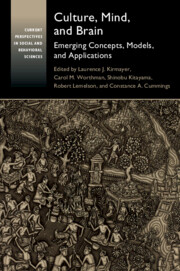Book contents
- Culture, Mind, and Brain
- Current Perspectives in Social and Behavioral Sciences
- Culture, Mind, and Brain
- Copyright page
- Dedication
- Epigraph
- Contents
- Figures
- Tables
- Contributors
- Preface
- Abbreviations
- 1 Introduction
- Part I Dynamics of Culture, Mind, and Brain
- Part II Applications
- 12 The Cultural Brain as Historical Artifact
- 13 Experience-Dependent Plasticity in the Hippocampus
- 14 Liminal Brains in Uncertain Futures
- 15 The Reward of Musical Emotions and Expectations
- 16 Literary Analysis and Weak Theories
- 17 Capturing Context Is Not Enough
- 18 Social Neuroscience in Global Mental Health
- 19 Cities, Psychosis, and Social Defeat
- 20 Internet Sociality
- 21 Neurodiversity as a Conceptual Lens and Topic of Cross-Cultural Study
- 22 Epilogue
- Index
- References
16 - Literary Analysis and Weak Theories
from Part II - Applications
Published online by Cambridge University Press: 18 September 2020
- Culture, Mind, and Brain
- Current Perspectives in Social and Behavioral Sciences
- Culture, Mind, and Brain
- Copyright page
- Dedication
- Epigraph
- Contents
- Figures
- Tables
- Contributors
- Preface
- Abbreviations
- 1 Introduction
- Part I Dynamics of Culture, Mind, and Brain
- Part II Applications
- 12 The Cultural Brain as Historical Artifact
- 13 Experience-Dependent Plasticity in the Hippocampus
- 14 Liminal Brains in Uncertain Futures
- 15 The Reward of Musical Emotions and Expectations
- 16 Literary Analysis and Weak Theories
- 17 Capturing Context Is Not Enough
- 18 Social Neuroscience in Global Mental Health
- 19 Cities, Psychosis, and Social Defeat
- 20 Internet Sociality
- 21 Neurodiversity as a Conceptual Lens and Topic of Cross-Cultural Study
- 22 Epilogue
- Index
- References
Summary
This chapter examines some conceptual problems that arise when we apply new embodied theories of mind in literary analysis. Critics have used affordance theory and models of predictive processing to reflect on narrative and genre, the literary devices and codes that shape our expectations about how a text will unfold. Instead of reinforcing the functionalist assumptions that guide cognitive scientists, including the effort to treat reading literature as just another cognitive task that is directed toward problem solving, this chapter proposes to view it instead as an emotionally engaging or ethically challenging way of reconstructing the ecology in which we think. This approach helps theorists honor the conceptual resources that the 4Es offer by giving more heed to individualized and culturally specific encounters with literary texts. I end by examining a poem that demands that we alter prevailing interpretive practices, thus exposing the way literature reorganizes emotional responses and value schemes.
Keywords
- Type
- Chapter
- Information
- Culture, Mind, and BrainEmerging Concepts, Models, and Applications, pp. 416 - 425Publisher: Cambridge University PressPrint publication year: 2020

